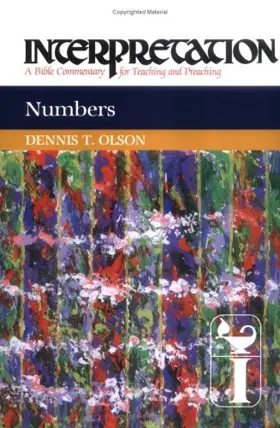

Numbers
Pages
196
Publisher
Westminster John Knox
Published
1/1/1996
ISBN-13
9780804231046
Collections
This book appears in the following featured collections.
- Tremper Longman's 5-Star Commentaries by Tremper Longman III
- Old Testament Advanced Commentaries by Moore Theological College Journal: Societas
Reviews
Dennis Olson's Interpretation (1996) considers how each section of the book contributes to the overall message of the book and majors in biblical theology and NT connections, focusing on the judgment on the first generation of the wilderness wanderings and the transition to the second generation that ended up entering the land. Olson argues that the structure of the book is based on that very transition, arguing for a final-form unity of the book along such lines. He has the preacher in mind, as is usually the case in this series, but some reviewers take this volume to be a little more academically-focused. Olson's theological perspective is similar to the canonical-critical view of Brevard Childs, i.e. fairly critical with respect to the origin of the book and its historical accuracy but focusing on a structurally unified final form of the book when treating its theology and relevance to Christian appropriation of the book's message. He treats the theological message as being first given to a post-exilic setting, which I find thoroughly implausible, but his theological insights are widely respected by scholars of fairly conservative stripes.
[Full Review]
Louisville: Westminster John Knox, 1996. Pp. xii + 196, Hardcover, $23.00, ISBN 0804231044. Mayer I. Gruber Ben-Gurion University Beersheva, Israel As is explained in the series editors’ preface (p. v), the purpose of commentaries in the Westminster John Knox Interpretation Series is to replace neither “the historical critical commentary” nor “homiletical aids to preaching. The purpose of this series is rather to provide a third kind of resource, a commentary which presents the integrated result of historical and theological work with the biblical text.” In his own preface (p. vii) Dennis Olson explains that his goal is “to interpret the literary and theological structures and movements of Numbers in the hope that they may inform and excite the theological imagination of preachers, teachers and students of Scripture in the context of the contemporary church.” What is in store for the reader is fully laid out in the opening sentence of the author’s preface, in which he states, “My own wilderness journey with the book of Numbers began in a 1982 graduate seminar on Numbers taught by Brevard Childs at Yale University.” In other words, Olson suggests, the journey about two millennia ago from Africa to Palestine through an inhospitable desert of sixty myriads of newly emancipated slaves, only two of whom would survive the journey, is to be compared with life as a graduate student at Yale University in 1982! Unlike some of the more widely read books of Hebrew Scripture such as Genesis and Deuteronomy, Samuel and Kings--each of which, by and large, tells a story with a beginning and a middle and an end-- Numbers appears to most contemporary readers to be aptly described as the junk room of the OT. Olson (p. 101) demonstrates that Numbers 15, which looks like the veritable junk room of the book of Numbers, is “an artfully designed treatise of laws and narrative echoes.
[Full Review]




